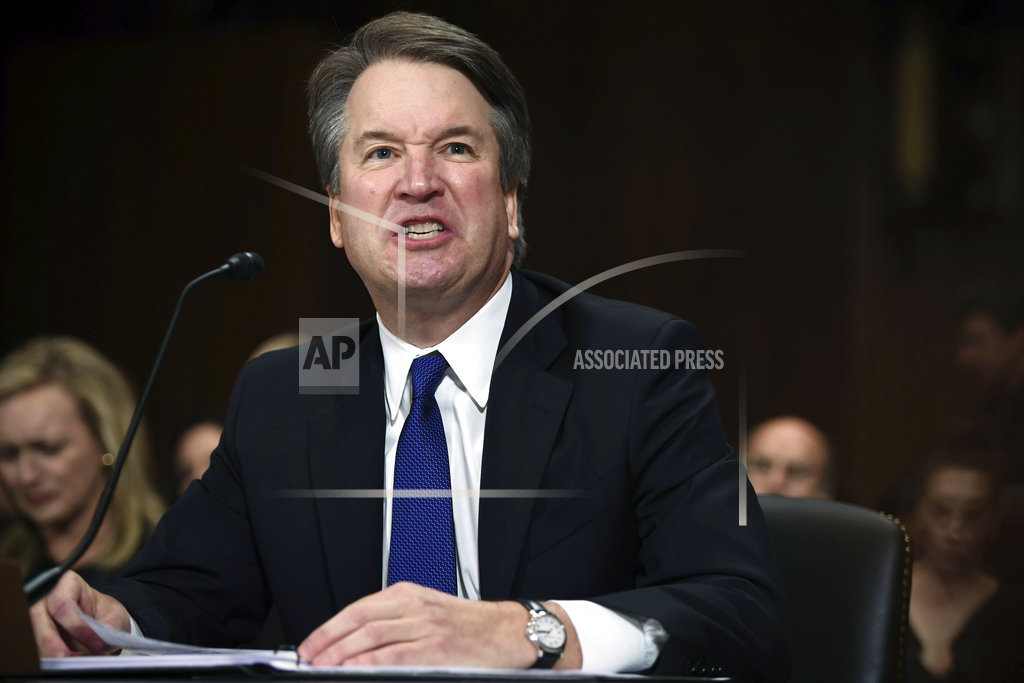
WASHINGTON (AP) — To some, Brett Kavanaugh is clearing his name. To others, he’s veering into conspiracy theory.
But in blaming “revenge on behalf of the Clintons” for the sexual misconduct allegations against him, the Supreme Court nominee is drawing new attention to his time on the Kenneth Starr team investigating Bill Clinton. And in doing so, Kavanaugh has shown he can deliver a Donald Trump-like broadside against detractors even if it casts him in a potentially partisan light.
As a young lawyer, Kavanaugh played an important role on Starr’s team investigating sexual misconduct by the then-president and helped shape one of the most salacious chapters in modern political history.
Kavanaugh spent a good part of the mid-1990s jetting back and forth to Little Rock, Arkansas, digging into Bill and Hillary Clintons’ background, according to documents made public as part of his nomination to the Supreme Court.
It was Kavanaugh who pushed Starr to ask Bill Clinton, in graphic detail, about the nature of his sexual relationship with White House intern Monica Lewinsky. In a memo from 1998, Kavanaugh wrote that Starr should ask Clinton whether he engaged in phone sex and specific sexual acts with her.
Starr took Kavanaugh’s advice. His resulting report ultimately presented evidence that Clinton, in denying the affair, lied under oath. The report became the grounds for Clinton’s impeachment.
Now it’s Kavanaugh who is facing sexual misconduct allegations, including from Christine Blasey Ford, who said he groped her at a party when they were teenagers and tried to remove her clothes. And it’s Kavanaugh who was pushed to speak publicly in personal, painful detail.
In testimony to the Senate Judiciary Committee, Kavanaugh forcefully denied ever sexually assaulting Ford or anyone else. In an emotional statement, he put the blame for the accusations against him partly on the Clintons.
“This whole two-week effort has been a calculated and orchestrated political hit,” Kavanaugh testified. The 53-year-old said it was being fueled by “pent-up anger” over Trump’s 2016 election victory and outside groups stoking fear about his judicial record. He also said it was revenge on behalf of the Clintons.
The “revenge” line has reverberated this week as senators await the results of an FBI background check investigation into sexual misconduct allegations against Kavanaugh. Democrats have called the comment a breathtaking breach of judicial impartiality that should be disqualifying on its own. Republicans have defended the tenor of Kavanaugh’s remarks, saying he had every right to be upset. GOP Sen. Orrin Hatch of Utah calls it “righteous anger.”
Among those stunned by Kavnaugh’s comment was Chelsea Clinton, who told The Associated Press she thought what he said should be “disqualifying.”
“He channeled a conspiracy theory about my family and I thought, Oh goodness, like, Judge Kavanaugh, I don’t even think I knew who you were until you were nominated,” she said. Clearly her family was “looming larger” in his mind that he was in hers, she said.
“But even if he’d gone after a former Republican president or a current Republican senator or politician, I would feel the same way that that kind of blatant partisanship should be disqualifying.”
At an event Tuesday, Hillary Clinton scoffed, “Boy, I’ll tell you, they give us a lot of credit.”
Clinton tried to run the logic of Kavanaugh’s claim during an event hosted by The Atlantic. “It would’ve had to have happened 36 years ago,” she said, “and that seems a stretch, even for the vast right-wing conspiracy stories about me.”
At last week’s hearing, Democratic senators were startled, too.
“Is it your testimony — that the motivation of the courageous woman who sat where you did just a short time ago was revenge on behalf of a left-wing conspiracy or the Clintons?” asked Sen. Richard Blumenthal, D-Conn.
Others welcomed Kavanaugh taking a page from the playbook of the man who nominated him.
It wasn’t quite a “Lock her up!” Trump rally cry, but Kavanaugh’s allies appreciated a hard-hitting defense of his own name and character that name-checked the Clintons. Sen. Lindsey Graham, R-S.C. backed him up.
“Would you say you’ve been through hell?” Graham asked Kavanaugh.
“I’ve been through hell and then some,” Kavanaugh testified.
While Kavanaugh’s role in the Starr investigation is a part of his resume that may have received short shrift during days of confirmation hearings, plenty of players from that era remain central to today’s confirmation fight.
Graham was a chief House prosecutor during Clinton’s impeachment trial. Other senators on the committee straddle both eras. Clinton has been making media rounds. Starr has recently published a new book about his experience.
A former top aide to Clinton’s 2016 presidential campaign, Brian Fallon, leads the outside group Demand Justice that Kavanaugh was likely referring to in his outburst.
Democrats had tried to portray Kavanaugh as a partisan warrior from the moment he was nominated, but failed to gain much traction with it. But the Clintons’ revenge theory revealed a different side of Kavanaugh that won’t be forgotten if he makes it to the high court.
Julian Zelizer, a professor of history at Princeton University, said Kavanaugh “has been fighting the Republican war since the 1990s.”
“He revealed a great deal about who he is and what drives him,” he said.



